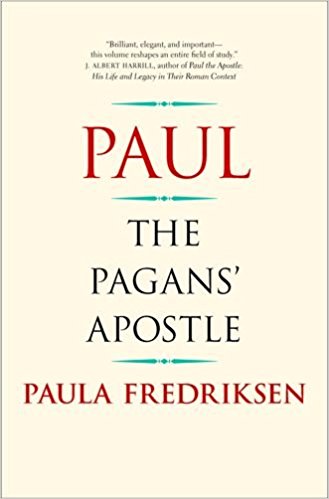Whether one is happy with the fact or not, Paul is quite committed to the notion that his fellow non-Christ following Jews are lost, and need to be won to Christ. This is especially, and excruciatingly clear in Rom. 9.1-5 where in great anguish he says that he could wish himself anathema, cut off from the Christ he loves and serves, if only his fellow ethnic Jews could be won to Christ, could be saved. He goes on to say they have been broken off from the people of God (Rom. 10-11), though only temporarily. They can be grafted back in. Yes, however appalling it may seem to many, Paul says his fellow non-Christ following Jews are lost without and outside of Christ.
This is not merely a later Christian imposition on Paul by Augustine and his later admirers. This is Paul’s own view, and it is a radical view. What materializes however in Rom. 9-11 if read right through, is that Paul believes God has a plan to rescue Israel, when Christ returns, when the Redeemer comes back from heavenly Zion and turns away the impiety of Jacob and so ‘all Israel will be saved’ by the mercy and grace of God in Christ when he returns. They will enter this Jew and Gentile united body of believers on the same basis as Gentiles— by faith in Christ– whoever believes in their hearts and confesses with their lips that Jesus is Lord will be saved (Rom. 10).
If one wants to say that Paul remained a Jew, say a messianic Jew who believes Jesus is the savior, and that everyone, Gentiles included with Jews, needs to be a part of that form of Judaism, Jew and Gentile united in the Jewish messiah Jesus, that case can and has been made. But the form of Judaism Paul is advocating didn’t really exist before the time of Christ, and didn’t exist after his coming outside of the small community of Jewish Christ followers in Jerusalem and elsewhere.
The case that can only be made by dismissing or misreading much of the Pauline evidence is the notion that God intended to have two peoples of God, with two different means of salvation. Paul tells us plainly “five times I have received from the Jews the forty lashes minus one” (2 Cor. 11.24). This not only means he went to the synagogues repeatedly before writing 2 Corinthians, going to convert people to the following of Jesus, you will notice that he also distinguishes himself from ‘the Jews’, by which he means the ones who don’t follow Christ. Paul does not see himself as in continuity with them, he sees himself as at odds with them over the issue of Christ and following Christ. But, nevertheless, he doesn’t stop going to the synagogues to proclaim Christ just because he has been violently opposed by Jews.
Fredricksen for her part gives the following explanation for Paul being flogged in the synagogues—“it was the ekklesia’s socially destabilizing practice of separating a city’s pagans from their gods, and not some imagined infraction of Jewish practice, that explains Paul giving, and then later getting disciplinary flogging” (p. 168). This rather ingenuous explanation simply does not work historically. Jews, quite apart from the Jesus movement and apart from Paul had been separating some pagans from their polytheism for generations. They are called God-fearers and proselytes. They existed long before the Jesus movement especially in the Diaspora, as is attested in numerous places, for example, in the stadium in Miletus where they had marked or designated seats, so inscribed!
Paul wasn’t flogged for recruiting Gentiles away from pagan deities. If that had been all he did, the synagogue would had cheered the victory over polytheism and idolatry! No indeed, Paul was flogged for his commitment to the Jewish messiah Jesus, a message that was found to be an aberration time and again in the synagogues when Paul tried to recruit both some Jews and some God-fearers. As we used to say in N.C.— ‘sorry, that dog won’t hunt’, that argument does not work.













